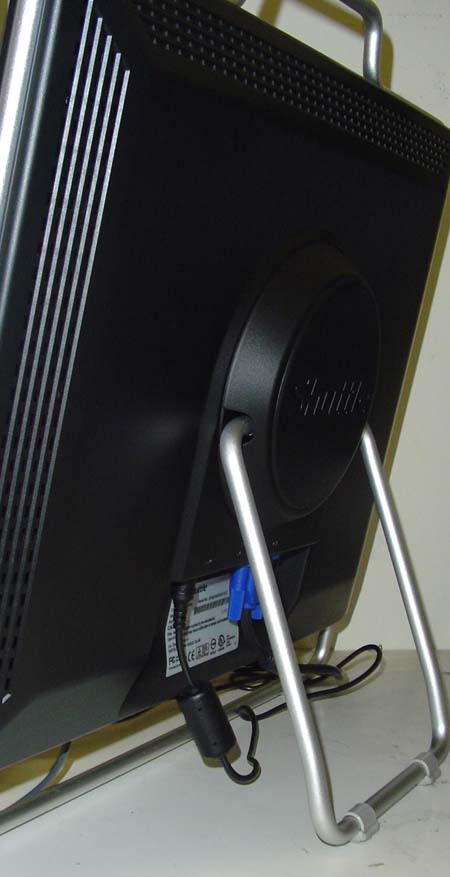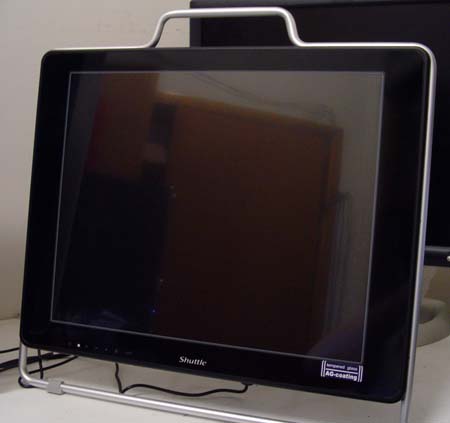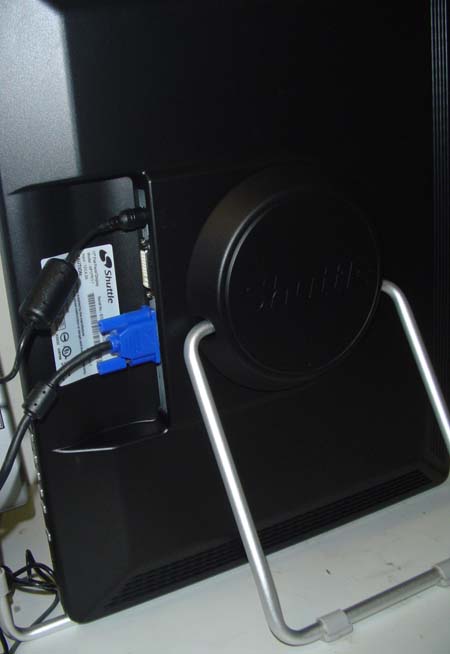Shuttle XP17 Preview: A better looking 16ms LCD
by Kristopher Kubicki on July 29, 2004 12:05 AM EST- Posted in
- Displays
Construction
The XP17 strikes us as unique in many ways, just as we take it out of the box. First, its stand-less design, which keeps the monitor extremely thin and light because there is no need for counter weighting at the bottom. The monitor hugs the desk low, but does not offer pivot or rotation of any kind.The second immediate reaction that we had is the similarity to the AG Neovo S series LCDs, which we looked at almost two years ago. In fact, both the AG Neovo S-18 and the Shuttle XP17 use glass bezels on stand-less designs. We were always appreciative of the glass bezels found on AG Neovo LCDs, so the fact that the XP17 uses one is a plus. Glass bezels not only look sharp and slightly nostalgic, but they also provide reflection damping and color filtering that we cannot get on a normal LCD. The unfortunate pitfalls of glare and weight should be considered, but the XP17 still weighs less than just about every LCD that we have reviewed to date, at 4.3Kg.
The LCD boasts a unique feature that we have not seen on an LCD before as well - a top mounted handle for carrying. Shuttle's XPC small form factors are professional quality PCs, but part of their appeal for so many is their portability. If any of you have been to a BYOB Lan party recently, you know that half the machines there are SFF's of some kind. With that in mind, throwing a handle atop the XP17 makes perfect sense. Our XP17 even came with a carry case, but we are told that this does not come standard with new purchases.
| Shuttle XP17 FPD | |
| LCD | 17" SXGA LCD (Active Matrix) pixel pitch: Anti-glare coating |
| Panel Depth | 6-bit FRC (16.2M Colors) |
| Scanning Frequency | Horizontal: 65KHz Vertical: 56-75Hz |
| Response Time | 16ms (Typical) |
| Contrast Ratio | 450:1 (Typical) |
| Compatibility | 1280 x 1024 (Native) |
| Brightness | 260 cd/m2 |
| Power | Working: 35W Standby/Off: 5W |
| Warranty | 3 years parts and labor |
Like most 16ms LCDs, you will notice that this XP17 comes with a 16.2M color panel. As kind of a dirty hack, LCD panel manufacturers have been opting 6-bit LCD panels over 8-bit LCD panels for high response time applications. 6-bit LCDs are capable of quicker response times due to the smaller amount of circuitry. The 6-bit panels are subjected to some particular method of dithering basically to make the image "appear" like 16.2M colors. Don't be fooled; the color saturation between an 8-bit LCD and a 6-bit one are still night and day for some people. Particularly when the brightness is turned up too low or too high, signals near the extreme lights and darks tend to wash out quickly; an issue that we have talked about before.
Other specifications of the monitor bode well. The 260 nit brightness and 450:1 contrast ratio fall well within something that we would like to see. Our LCD came with zero pixel and zero sub pixel defects.













15 Comments
View All Comments
aw - Thursday, July 29, 2004 - link
How bout an XPC system review?s2kpacifist - Thursday, July 29, 2004 - link
Anandtech should do a 12 to 16ms response time LCD shootout (and maybe give us the real color specs of the 710T, hehe).goku21 - Thursday, July 29, 2004 - link
I know the apple monitors have a 16ms response time too, even up to the 30" sucker.goku21 - Thursday, July 29, 2004 - link
microAmp - Thursday, July 29, 2004 - link
Broken link:http://www.anandtech.com/displays/showdoc.aspx?i=2...
Curious, what is the angle of the monitor since it looks like it is in a fixed angle?